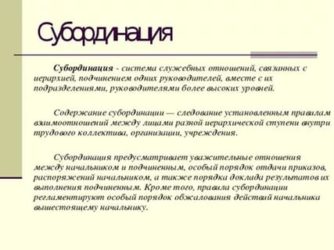- Lack of familiarity. If a manager makes a subordinate his friend, it will be very difficult to give tasks or criticize work. The harshness of the boss in such a situation can lead to hidden conflicts and hostility. An example of familiarity is talking about personal life over a cup of tea. Naturally, a boss can communicate with a subordinate. However, you should stick to topics that are not too personal.
- Correct attitude. The employee, in turn, should not speak about his superiors in a negative tone. This does not mean complete submission. If the leader is a tyrant, the problem should be resolved legally.
- Politeness. If a subordinate wishes to propose any idea to the manager, he should do so as politely as possible. You must enter the boss's office only after knocking first.
- Maintaining hierarchy. You only need to contact your manager, and not this manager’s boss. Such jumping over a step can offend the manager.
- No insults. Disputes may well arise between a manager and a subordinate. And it is very important to conduct them correctly. In this case, differences of opinion will only enrich the work. During conflicts, you cannot insult a person based on his religious or political beliefs. It is strictly forbidden to point out flaws in appearance.
Fundamental Concepts
The Labor Code imposes obligations on company managers, so a commercial organization cannot exist without a clear vertical and horizontal chain of command (we'll talk a little later).
Neglect entails individual and general punitive measures: oral/written comments, reprimand, dismissal due to immoral behavior, dismissal of an employee for absenteeism.
How to properly build subordination in a work team - watch this video:
Subordinate - leader
You also need to be able to build relationships with your boss, just like relationships between a boss and a subordinate. After all, his future career will depend on how correctly an employee adheres to the norms of business relations. Inept actions and ingratiation with the manager can push him away from his subordinate and force him to draw negative conclusions about the employee. Therefore, we will give several examples showing correct and incorrect behavior in communication between an employee and his boss.
- Try to help create a positive atmosphere among the team, because the manager strives to unite the staff and set up teamwork in the company.
- You must express your position and work proposals tactfully and politely; the manager will not tolerate impudent comments in his direction. Use phrases: “Excuse me, “Could we try this option...”.
Employees should voice their suggestions delicately and tactfully
- You cannot give monosyllabic answers and talk to your boss in a categorical tone. The manager may consider that the employee has a negative attitude towards him, and such people do not stay in the team. The first to be laid off are the taciturn and eternally dissatisfied subordinates.
- It is necessary to avoid jumping “over the head” of the immediate supervisor, except in urgent and emergency cases. Such behavior will be regarded by the immediate superior as disrespect and doubt in his professionalism. In this way, the employee undermines the authority of the boss in front of the entire team, which can serve as a reason for a reprimand and a fine.
- You cannot enter the boss’s office without knocking, and also not visit it if the boss is communicating with someone. This conversation can be important, and you can interfere.
Features of service relationships
There is no clear list of distinctive features of a working relationship, but we will try to highlight a few:
- hierarchy - each organization has an established vertical of power, documented in the job description, collective agreement, labor agreement. Here you will find out what rules are used to draw up the job description of the general director of an LLC;
- ethics – the legislation does not establish a clear line of behavior for employees and management. Norms of behavior and business communication are formed under the influence of ethical and moral principles and education;
- sanctions - non-compliance or non-compliance with generally accepted standards of behavior entails financial penalties, verbal reprimands, demotions, and dismissal. How to correctly draw up a disciplinary sanction order - read the publication at the link;
- improvisation – in our country there are no high-quality educational institutions that would teach corporate etiquette and the rules of business communication.
Regulation of official etiquette
If company management neglects to develop rules, this is fraught with chaos and confusion in the work process. Each employee should know who will help him, whose requirements he must fulfill, how much work his subordinate is ready to handle.
Large organizational structures build structural diagrams where the hierarchy between divisions and departments is clearly visible.
As mentioned above, the rules and norms of behavior are determined by: orders, the charter of the enterprise, labor and collective agreements, job descriptions. The rules for drawing up and executing a job description for a chief accountant are discussed here.
There is no legislative regulation of relationships, but Article 192 of the Labor Code of the Russian Federation lists the main types of disciplinary sanctions.
Labor Code of the Russian Federation Article 192. Disciplinary sanctions
For committing a disciplinary offense, that is, failure or improper performance by an employee through his fault of the labor duties assigned to him, the employer has the right to apply the following disciplinary sanctions: 1) reprimand; 2) reprimand; 3) dismissal for appropriate reasons. Federal laws, charters and regulations on discipline (part five of Article 189 of this Code) may also provide for other disciplinary sanctions for certain categories of employees. Disciplinary sanctions, in particular, include the dismissal of an employee on the grounds provided for in paragraphs 5, 6, 9 or 10 of part one of Article 81, paragraph 1 of Article 336 or Article 348.11 of this Code, as well as paragraph 7, 7.1 or 8 of part one of Article 81 of this Code Code in cases where guilty actions giving grounds for loss of confidence, or, accordingly, an immoral offense were committed by an employee at the place of work and in connection with the performance of his job duties. The application of disciplinary sanctions not provided for by federal laws, charters and regulations on discipline is not permitted. When imposing a disciplinary sanction, the severity of the offense committed and the circumstances under which it was committed must be taken into account.
Inner order rules
Recommendations to help you save your job:
- Do not make sarcastic and rude remarks directed towards a superior. If you have a constructive suggestion, express it politely.
- Closedness and reticence are the main vices when communicating with superiors. Try to show more interest in the conversation, do not answer in monosyllables.
- Address your superiors carefully, as your immediate supervisor will take this as a sign of disrespect on your part.
- If the team is given a task, but responsibilities are not assigned, do it yourself. Such a solution will increase efficiency and eliminate discrimination in labor activities.
- Don't make empty promises that you can't keep. Soberly assess your chances of success.
- Don't use your colleagues as a tool for self-realization.
- Try to take the initiative when solving non-standard problems, do not hesitate to express your opinion. Be a support for your superiors and other employees of the company.
Read more: The plaintiff did not appear at the court hearing - consequences
Key principles of subordination.
Consequences of non-compliance and violation of labor discipline
Isolated cases of insubordination lead to verbal reprimand from senior management. After the debriefing, the boss closely monitors the offender.
The extreme penalty is dismissal. Management meets the offender halfway and offers to write a letter of resignation of his own free will. However, extreme dissatisfaction leads to unilateral termination of the employment contract. The note is entered in the work book.
Violations of labor discipline and responsibility for them

According to labor legislation, internal labor regulations must be developed and approved at each enterprise. Such a document serves as the main instruction for employees of the enterprise, and these rules prescribe all the nuances of the labor process and labor discipline: from the start time of the working day to the procedure for issuing bonuses and maintaining the trade secrets of the enterprise.
It would seem that there is such a particularly terrible thing if you come to work a minute later than the official start of the working day? But in fact, this is a violation of labor discipline, which can entail serious penalties. Let's try to figure out what compliance with labor discipline consists of, what offenses can be considered as a violation of it, and how this threatens the employee.
Violation of labor discipline - definition and types
Labor discipline is a set of rules of conduct adopted by the enterprise (labor safety rules, internal labor regulations, corporate ethics, etc.) that are obligatory for all employees of an enterprise (from management to ordinary employees). An important nuance is that the employer is not only obliged to develop and approve such rules, but also to provide conditions for their proper implementation - otherwise, failure to fulfill labor duties and failure to comply with labor discipline is not the fault of the employee.
In order to apply penalties to an employee for a violation, it is necessary to determine what constitutes a violation of labor discipline. And to do this, you first need to clearly understand what is included in the concept of labor discipline.
Responsibilities of the employee
According to the Labor Code of the Russian Federation, an employee is obliged to:
- comply with labor standards established at the enterprise;
- conscientiously perform official duties;
- comply with labor protection rules, internal labor regulations, Regulations on trade secrets and the requirements of other regulatory documents adopted by the enterprise;
- treat the property of the enterprise with care;
- If a situation arises that threatens people’s health or life, or the safety of the enterprise’s property, immediately notify the immediate supervisor.
Violation of any of the above points is considered a violation of labor discipline.
Types of labor discipline violations
Depending on the norms of the labor process, the following three types of violations of labor discipline by an employee are distinguished:
- technological (violation of technological standards);
- violation of subordination and coordination in the process of labor management (violations of management norms);
- violation of working hours and rest time (violation of regime norms).
Thus, the release of defective products due to the fault of an employee will be a technological disciplinary offense, and, for example, absenteeism can be considered a violation of regime norms.
Depending on the type of violation, the causes of the incident are investigated and the necessary documents are collected.
List of labor discipline violations
The main violations of labor discipline are usually considered:
- violation of labor safety rules leading to an accident or incident;
- appearing at the workplace in a state of drug, alcohol or other toxic intoxication;
- absenteeism;
- regular lateness to the start of the working day and after the lunch break;
- leaving work early for lunch breaks and at the end of the shift;
- theft of work property, embezzlement, damage to equipment and other property of the enterprise;
- performance of one’s work duties not in full, not in accordance with established quality criteria (improper performance of one’s duties);
- disclosure of a commercial secret of an enterprise;
- refusal to undergo training or medical examination if this is necessary for the high-quality and qualified performance of work duties;
- immoral act;
- direct disregard of the manager’s orders;
- insubordination;
- deliberate failure to comply with instructions and orders;
- participation in activities that undermine the authority of the leader.
Several absences in a row, appearing at the workplace while intoxicated, theft, forgery of documents, as well as immoral acts are considered a gross violation of labor discipline.
It is also worth remembering that improper performance of duties may be as follows:
- at the place of performance;
- according to the deadline and time of execution;
- by volume of execution;
- according to the form of execution;
- by method of execution;
- by subject of execution.
Acts of violation of labor discipline are called disciplinary offenses.
It is necessary to add that it is necessary to distinguish between the financial liability of employees and disciplinary offenses, since financial liability can occur or continue after the end of the employment relationship if material damage to the enterprise was caused while the employee was listed as an employee of the enterprise.
Penalties for violations of labor discipline
p>The penalties that the employer has the right to apply to the employee are prescribed in Article 192 of the Labor Code of the Russian Federation. These include:
- rebuke;
- comment;
- dismissal.
At the same time, the employer also has the right to deprive the employee of a bonus (as part of a reprimand, if such a procedure is reflected in the internal documents of the enterprise).
For a certain category of employees whose labor duties are regulated by separate Federal laws, other penalties are also provided.
Reprimand for violation of labor discipline
Upon the fact of an employee’s misconduct, an act of violation of labor discipline must be drawn up, which must reflect the essence of the offense, the explanations received from the employee and the remark received. The remark in itself does not threaten the employee with any special troubles, but it will be possible to talk about a systematic violation of labor discipline if the employee commits another disciplinary offense in the near future.
Reprimand for violation of labor discipline
A reprimand is issued for a disciplinary crime (misdemeanor) committed and can be ordinary or severe. The reprimand is not entered in the work book, but is recorded in the order; it is noted in the work book only if the employee is fired for improper performance of job duties and systematic violation of labor discipline.
Dismissal for violation of labor discipline
Dismissal is a last resort measure. It can be applied in the event of a systematic violation of labor discipline by an employee and failure to fulfill his duties, as well as in the event of a gross disciplinary offense.
For example, educational institutions may fire an employee who has committed an immoral act.
Responsibility for violation of labor discipline
According to labor legislation, each employee is responsible for maintaining labor discipline at the enterprise and each employee must be familiarized with the internal labor regulations, labor protection documents, job descriptions and other documents regulating his work activities, upon signature. If an employee violates labor discipline, the employer has the right to apply penalties at its discretion, depending on the severity of the offense.
Types of subordination
Depending on the object under consideration, it is customary to distinguish between two variations of service relations.
Vertical hierarchical chain
In the organizational structure, this is the relationship between the boss and subordinates, employees and the manager.
A few rules that will prevent passions from heating up in the team:
- If the employee does not complete the assigned task, remind him of the consequences of such shirking. By going with the flow, you indulge the slackness of the organization's staff;
- It is better to make comments to an employee face to face, this way you will save his face in the eyes of the team. Do not get personal or insult;
- do not panic in difficult situations, the leader always remains with a cool head;
- do not discuss in public with your superiors;
- if your boss consults with you, try to show your knowledge and creative thinking;
- It is better to contact your manager with questions, rather than a superior person. This can humiliate your boss.
Horizontal relationships
Here relationships between employees and department heads are formed. It is more acceptable to follow the ideals of democracy and partnership. A few rules that will make the corporate atmosphere friendly:
- divide responsibilities equally if the manager has not appointed specific performers;
- refrain from fighting for clients, they can always be found, but relationships with colleagues will deteriorate irrevocably;
- Discussion of personal life is unacceptable during work activity.

Basics of subordination in business relations.
If you are communicating with a peer leader, pay attention to the following recommendations:
- clearly and concisely present important information, do not demand immediate answers from the interlocutor to the questions posed;
- operate only with facts and figures - this will force your partner to understand the essence of the issue;
- do not engage in confrontation, remain calm, keep your emotions under control;
- initiative in developing a project is good form;
- the use of obscene language is unacceptable;
- To strengthen your acquaintance, exchange business cards with your interlocutor.
Common errors
No one is immune from shortcomings, so it is important to familiarize yourself with the following typical errors:
- The director of the enterprise gives orders to the department, bypassing the immediate superior. This undermines his authority in the eyes of his subordinates.
- Control over the execution of orders is carried out by another person. To avoid misunderstandings and arbitrariness, specify the powers of such a person in advance.
- Assigning two employees to solve one problem. This not only creates competition, but also slows down the work of the organizational structure.
- There is no priority for completing urgent tasks. The employee must understand what is most important now.
- Personal insult is a terrible sin for a leader. Trying to stimulate a subordinate, the boss not only aggravates the situation, but also asserts himself at the expense of another.
Between subordinate and leader
Subordination is a necessary element of corporate ethics. This is a set of rules of conduct, an important element of which is all the subtleties of the relationship between a boss and a subordinate. These are not just rules of good form and manners. Subordination ensures respectful treatment and productive work. For example, many managers face the following problem: they treat their subordinates very softly, as a result of which the latter begin to miss deadlines and perform their work poorly. It is difficult for a manager who does not respect the chain of command to point out the shortcomings of the work of his subordinate, who has become almost his friend. Rules help you save nerves and avoid conflicts.
Normative base
- Vertical. Assumes that the higher level gives instructions to the lower one. For example, a manager gives tasks to his subordinate. The latter is obliged to fulfill them.
- Horizontal. Involves interaction between employees of equal status.
- A system of strict subordination of lower-level employees to higher-level ones, based on discipline.
- Following the rules of relationships in a hierarchical structure.
- Relations between units in a work environment, where the subordination of some to others is implied.
System of relationships according to subordination
If you follow the rules of subordination, interaction in all areas of activity occurs more efficiently. These are three main planes, namely:
- The leader is the performer.
- The executor is the leader.
- Relationships between partners.
Read more: Notary's fee for registration of inheritance
In many organizations, the authority of the leader is very high. It follows from this that in a team it depends on the boss how well each employee understands the norms of behavior, taking into account subordination. This means that labor discipline is maintained within the proper framework, and employees do not confuse orders with requests or recommendations.
Orders, requests and advice
- when the boss gives a task, the work should be equally divided among all team members so that there are no slackers;
- it is necessary to avoid conflicts of interest and pulling over clients: a couple of clients will not help you get a promotion, but will spoil the atmosphere in the team, which is why you will have to work in a tense environment;
- if you can't help, don't promise it;
- You shouldn’t start intimate conversations at work, as this can lead to a deterioration in your relationship with your boss and colleague in the future.
Colleagues
An employee who does not adhere to the norms of business communication may be dismissed for insubordination. A person who plans to stay at work and move up the career ladder is simply obliged to adhere to the chain of command, because his future largely depends on his boss.
In addition, subordination at school must also be observed between teachers; for example, it is completely unacceptable for one teacher to address another using a diminutive name - something like “Verunchik or Valyushka.” Teachers should not demonstrate romantic relationships in the presence of children, even if such exist, etc. Subordination in school is, first of all, a respectful attitude of teachers and students towards each other.
How relationships are built
Maintaining order like the army is easier than gaining authority among subordinates. But there are several rules that make a leader successful:
- If the boss appreciates the work of employees, he does not skimp on praise and adequate monetary reward.
- The ability to take full responsibility for running a business at a critical moment.
- The desire to fairly distribute work among subordinates.
- Instructions are given without raising one's voice, but also without entering into familiar relations.
- The key principle is money only for work completed.
- Orders are allowed only in exceptional cases or if the employee does not fulfill his obligations.

Insubordination labor code

The rules of subordination are established by the company’s internal documents, such as:
Each company has the right to independently develop rules of subordination that are relevant for a specific space. However, they are all based on basic ethical standards.
FOR YOUR INFORMATION! Within the framework of the law, the rules of subordination are regulated by Article 192 of the Labor Code of the Russian Federation. Here is the responsibility for failure to comply with established standards.
Basic rules of interaction between company representatives
The norms of subordination depend on the type of hierarchy:
- Vertical. Assumes that the higher level gives instructions to the lower one. For example, a manager gives tasks to his subordinate. The latter is obliged to fulfill them.
- Horizontal. Involves interaction between employees of equal status.
Between subordinate and leader
Within a vertical hierarchy, the main role belongs to the manager. He has a great responsibility for healthy communication. Let's consider the basic rules within such relationships:
The manager needs to remember that he is the one who sets the main tone in the relationship.
Between bosses
The respectful attitude of managers towards each other allows us to create a favorable climate in the company. It must be remembered that fish rots from the head. If management has conflicts, then ordinary employees will inevitably have them too.
Between subordinates
Less stringent requirements are imposed on subordinates. Let's look at the basic rules:
Subordination between subordinates is determined purely by the specifics of the company. For example, young creative companies have a friendly environment.
Responsibility for failure to comply with the rules of subordination
Responsibility for non-compliance with the rules is stipulated in Article 192 of the Labor Code of the Russian Federation. In particular, these are the following measures:
IMPORTANT! An employee can only be fired if there are repeated gross violations of subordination. For example, an employee spreads gossip that discredits the business reputation of the manager, insults, or uses physical violence.
FOR YOUR INFORMATION! Insubordination implies negative consequences. In particular, the work of the company is disrupted.
https://assistentus.ru/trudovoe-pravo/otvetstvennost-za-nesoblyudenie-subordinacii/
Subordination in business relations: what is it and why?
Subordination in business relationships works both ways, since not only subordinates must listen to and respect management, but management must also be tactful and polite, even when they are dissatisfied with the work of employees and make comments to them.
How is it regulated?
Each company and organization must have its own vertical and horizontal lines of subordination. Deviation from them entails a certain disciplinary responsibility, not only individual, but also collective.
Article 192 of the Labor Code of the Russian Federation lists all types of subordinate disciplinary sanctions. Violation of subordination in business relations may entail consequences, namely:
Types of subordination
As mentioned above, there are 2 lines of subordination in the team. This means that, accordingly, there are 2 types of subordination in business relations:
- Vertical labor relations
- Horizontal labor relations
The advantages of such a system:
- Coordinated and productive work in a team, since employees do not waste energy and time sorting out any relationships with management
- Each person, due to a clear hierarchy, has his own clear place, and his rights are not infringed in any way
- The management treats all its employees equally and does not reward those with whom it is on friendly terms
His further career growth depends on how a subordinate communicates with his manager. Excessive ingratiation or, conversely, a rude tone can anger your superiors.
The advantage of horizontal subordination is that with a good atmosphere in the team, overall productivity increases. People who respect and listen to each other and work as a team are truly capable of amazing things.
Consequences of non-compliance
Fortunately, in most cases, insubordination in business relationships is not a criminal offense, and it is often #8212; ordinary violation of certain ethical standards.
Subordination is a way of designating responsibility for each employee, both for superiors and subordinates.
Recommendations for subordination
There are several recommendations regarding how to behave in order not to violate subordination:
Subordination is an important aspect in labor relations, which affects the productivity of the entire work process, the atmosphere in the team, as well as the career growth of each employee.
https://pravodeneg.net/trudovoe/subordinatsiya-v-delovyh-otnosheniyah.html
Sample order of reprimand for violation of labor discipline
The Labor Code of the Russian Federation does not allow imagination to run wild when choosing a punishment - it contains an exhaustive list of types of penalties.
What is meant by violation of labor discipline?
Because in the event of a conflict situation, both the report and the explanatory note are considered on the basis of such documents.
What specific points are important to register at the local level, based on the Labor Code?
Warning order for violation of labor discipline
According to Art. 192 of the Labor Code of the Russian Federation for violation of labor discipline, only 3 types of disciplinary sanctions can be applied to an employee: reprimand, reprimand and dismissal.
In all other cases, when drawing up an order for disciplinary punishment for violation of labor discipline, it is necessary to adhere to the legally defined procedure and apply only those provided for in Art. 192 of the Labor Code of the Russian Federation types of penalties.
Insubordination
You need to understand that some people need constant monitoring, because without it they cannot work.
When communicating, it is very important to establish what form of instructions #8212; order, request, recommendation.
Most often, managers use requests, which expresses their friendly attitude.
Subordination at work
If you follow the rules of subordination, interaction in all areas of activity occurs more efficiently. These are three main planes, namely:
- The executor is the leader.
- The leader is the performer.
- Relationships between partners.
How relationships are built Maintaining order like the army is easier than gaining authority among subordinates.
Violations of labor discipline and responsibility for them
In order to apply penalties to an employee for a violation, it is necessary to determine what constitutes a violation of labor discipline.
Violation of labor discipline is the failure of an employee to comply with legislative norms and provisions of the internal labor regulations of the enterprise.
Sample order on violation of labor discipline
- work and rest schedule;
- fundamental rights, duties and responsibilities of the parties;
- incentive and penalty measures;
- other issues of regulating working relations with this employer.
- employment and dismissal of employees;
When hiring an employee, the director must familiarize him with the PVTR against his signature.
By signing the document, a person undertakes to follow the specified requirements and comply with the rules of labor discipline.
https://perspectiva78.ru/nakazanie-za-nesobljudenie-subordinacii-prikaz-83847/
No comments yet!
Source: https://jurpravda.ru/narushenija/narushenie-subordinacii-trudovoj-kodeks.html
How is subordination regulated?
The main documents, from the point of view of jurisdiction, are the organization’s charter and job descriptions. When starting a job, a contract is signed outlining responsibilities and rights in writing, although ethical standards of behavior are critical. Refusal to do so is considered a violation of labor discipline.
Subordinates must behave correctly and tactfully with their superiors in order to maintain a positive attitude in the team. Their further career growth directly depends on the behavior of employees. Therefore, a categorical tone, attempts to “bypass” the manager and appeal to higher authorities are not allowed. This may be considered an administrative violation.
No organization can exist without a clearly structured horizontal and vertical chain of command. Violation entails disciplinary liability: both individual and general. In this case, punishment in the form of a penalty is applied to the entire workforce.
Article 192 of the Labor Code of the Russian Federation considers the types of disciplinary sanctions. Failure to comply with subordination at work entails consequences in the form of the following penalties:
- Comment.
- Rebuke.
- Dismissal on grounds of moral turpitude.
A single violation of subordination causes a remark, after which the manager more carefully checks the quality of the employee’s performance of his duties. Reprimands are issued both orally and recorded in a personal file. Disciplinary offenses, both isolated and persistent, become the cause of reprimands.
An extreme measure, dismissal, is allowed in case of a gross one-time violation of subordination, potentially falling under an article of administrative or criminal violation (for example, beating a manager), or due to regular violations that negatively affect the situation in the team.
A friendly atmosphere in a team contributes to business advancement, so maintaining subordination is nothing more than a reasonable measure to achieve a common goal.
Insubordination is a fairly common phenomenon that can be encountered when applying for a job. It can manifest itself in a variety of ways. Therefore, it is worth taking this into account and knowing how to stop such practices in relation to yourself.
Definition
It is important to know! In general, working in a team where there is no chain of command is more difficult, since you don’t know what to expect from your superiors and colleagues. Over many years of research, it has been proven: in the place where the responsibilities and rights of all employees are most clearly regulated, there are the best indicators of productivity and efficiency.
Typical mistakes of non-compliance with subordination
The above rules must be adapted to your specific environment. Despite the fact that they are universal, the specifics of the business may require some adjustments. Therefore, it is impossible to say unequivocally that this means subordination, since everything depends on the conditions for applying the principles. The concept is subjective.
How should subordination be manifested?
If we consider the basic rules on which business relationships are built, then several points can be attributed to these. Moreover, in different planes they have different manifestations. So, for example, in the “boss-employee” relationship, the following are distinguished:
- Refusal of familiarity, which may ultimately interfere with giving orders and criticizing (within the limits of what is permissible, of course) the work of a subordinate.
- A correct attitude is observed first of all in the fact that in a relationship there should be no negatively manifested critical remarks in the form of insults, including behind the back of the person being criticized. Any issues are resolved legally. The bosses themselves often suffer from this point.
- Politeness is the basis of any business relationship. This is not to say that you should be completely bowed down, but proper etiquette is the basis for successful relationships in the work environment between all parties.
- Maintaining hierarchy requires addressing the leader, not his superiors. Otherwise, such steps of the manager may offend. The exceptions are those situations when the leader is truly a tyrant and it is impossible to come to an agreement with him under any circumstances.
- The absence of insults is the basis on which any disputes between the parties will be resolved in the most correct manner. If we are talking about insults on political, gender or other grounds, then we can already talk about discrimination.
Read more: State registration of mortgages is carried out
At the same time, the boss should understand that initially the rules of the relationship and their tone are set by him. But between bosses or partners, subordination is built not only on the above principles, but also on the following rules:
- Lack of subjectivity, that is, personal views on the subject of the dispute are not relevant to the business world. Here you need to rely on facts.
- Correct attitude requires polite attitude on any level, even between superiors at different levels. Criticism in front of subordinates is especially prohibited, otherwise the authority of the leader is undermined.
- Save time. Conversations should be conducted in a businesslike manner. This will create the most productive relationship possible.
A respectful relationship between managers and partners allows us to set a favorable background for the climate in the company. After all, it was precisely because of the violation of subordination in the team that the proverb that “the fish rots from the head” began to be used in the work sphere. Between subordinates, the rules of subordination are less stringent, but the main ones include:
- Lack of gossip, squabbles;
- Warm, but not overly friendly relations in the team are welcome;
- No encroachment on the client base of a colleague;
- No empty promises that the parties are not sure about.
These are the basic rules.
Subordination
It is just as important for an employee to find a common language with his colleagues as with his boss. Communication needs to be done correctly from the very beginning so that common problems do not arise. Some, using a good attitude towards themselves, shift professional responsibilities to others. Others show their comrades in a negative light in front of the boss. To avoid this, you should follow some rules:
Telephone communication
To begin with, it is worth noting that when communicating with a business person, you should not answer the phone. This is only permissible in very rare and important cases. When calling someone on business, you should first clarify whether it is convenient for the person to talk at the moment. Do not use swear words under any circumstances, as this may alienate your business partner.
Subordination is a way of determining the responsibility of each employee, from employee to director. It’s just that everyone’s responsibility is different, ordinary employees risk only their jobs, and the director of the company risks his name, reputation and funds. The higher a person’s responsibility, the more he will demand from his subordinates. Not a single successful company can exist without subordination and its observance; horizontal and vertical power is built on it.
Responsibility for non-compliance with subordination at work
As mentioned earlier, each company has its own measures to prevent improper actions. They can manifest themselves, according to Art. 192, in the form:
It is worth noting that dismissal requires either a gross violation of the rules, entailing a number of negative consequences for the company and the team, but in case of a one-time dismissal, a remark or reprimand is given. If the case goes towards dismissal, then these actions should be of an exclusively documentary nature. Otherwise, such manifestations may be considered unlawful and in court the decisions of superiors may be overturned in favor of the subordinate with appropriate compensation.
Boss - subordinate
Attitude towards a supervisor depends on a number of factors, including established work process standards and maintaining the authority of the supervisor. For correct subordination, it is necessary to correctly determine the company’s service discipline, the ethics of communication with the manager, and establish the framework of orders for its employees. When staff are not informed about the procedures and norms of business communication, discomfort appears in the team, people feel uncomfortable when communicating with the boss, do not know how to perceive his words (as a request or order), and do not show initiative. That is why every employee from the moment of arrival must be familiar with the norms of business and working relations.
Pay attention to the selection of tips on business relations between a manager and an employee.
- If the employee fails to comply with your order, you need to remind him that you are waiting for the result, otherwise he will decide that the task has been forgotten and will not carry it out. Such comments make it clear to the employee the seriousness of the order given to him and the possible consequences of failure to fulfill his duties.
- Criticism of an employee should concern his actions and actions at work. Personal insults and humiliation should not be present in a conversation with a subordinate.
A manager should not insult or humiliate his subordinate
- It is unacceptable to give personal advice to your subordinates. Do not forget that responsibility for the result will be on you.
- Whatever happens, subordinates should not notice fear and panic in the actions and words of the leader. Otherwise, authority will be seriously undermined.
Employees shouldn't see fear in their boss's eyes.
- Appreciate the work of your employees. The reward for a completed task should correspond to the amount of effort and time expended.
- Do not skimp on praising an employee. If he has done a good job, he should receive not only financial, but also moral reward. The employee must understand that his work was appreciated by management.
An employee must understand that his work is appreciated, so do not forget to express gratitude and praise employees
- Give orders based on two factors: the specific situation at hand and the character of the subordinate. Some employees immediately begin to carry out assignments and approach their work responsibly, while others need to be supervised and monitored for results.
When communicating with subordinates, you initially need to choose the form of instructions, be it an order, a request, a recommendation, or a question for thought. Orders are issued either in the event of a critical situation requiring immediate execution, or when communicating with an unscrupulous employee who does not understand other forms of instructions. The request is used in a standard situation and is expressed in the manager’s goodwill and trust. In the case of a request, the employee can offer his own options for solving the problem and express his opinion on the current situation. Such behavior by an employee is unacceptable when receiving an order that cannot be discussed and is executed without delay. A request differs from an order in its emotional presentation and sternness in the voice.
If a manager raises a question for consideration, it means he is waiting for feedback and wants to create a discussion of the problem. In this way, managers identify proactive employees who will subsequently solve the stated task or problem. Recommendations are given by the manager in order to help the subordinate quickly find a solution to the problem, but they may not be implemented by the employees.
The boss should not allow familiar relations with the team. Its employees perform functions in the same way as people outside the company whom we pay for the work done. If relationships are built on the principle “I pay money - you do your job,” then the business usually moves forward.
The manager should not stand in the shoes of his subordinates, delve into their problems and get away with violations, otherwise the staff will simply sit on his head.
Between managers
Business relationships can also be built horizontally, for example between two managers. At a business meeting, you must adhere to the following rules.
- Speak clearly and to the point; there is no need to start the conversation with jokes and unnecessary expressions of interest in your partner’s health and affairs. In Russia, meetings can last several hours due to the incorrectness of the stated purpose of the conversation. Many business people have a negative attitude towards empty dialogues because they value their time.
- Use facts and figures in your conversation; this will attract your partner’s attention and concentrate his attention on the dialogue.
- If the interlocutor begins to behave aggressively, remain calm, this will reduce the degree of dissatisfaction.
- Offer prepared ways to solve the problem; your initiative can be appreciated by your partner. This way you can show your level of knowledge and competence in the matter.
Offer your ways to solve the problem, your partner will definitely appreciate the initiative
- Try not to answer phone calls; this may seem disrespectful on the part of the interlocutor.
- Exchange business cards; this emphasizes your status and allows you to maintain contact with the right person.
- In a telephone conversation, be sure to ask the other person if he can talk at the moment.
- Do not use swear words in a business conversation; this characterizes the manager as an uncultured and poorly educated person. They try not to have anything in common with such a contingent of people in business.
Between colleagues
Finding contact and building proper communication with colleagues is also an important task. There are employees who, thanks to good relationships, shift their responsibilities to their comrades, or try to show others in an unfavorable light in front of their superiors. To avoid problems, you need to properly communicate with your colleagues.
- When performing a common task, divide the responsibilities in equal parts if the supervisor has not done so. This will help avoid the appearance of “drones” that will not be useful in your work.
Divide responsibilities equally between the team so that no one shirks about work
- Try to avoid crossing work contacts and intercepting clients of your colleagues. This will definitely lead to conflict and ruin your relationship with colleagues. It will be difficult to work in a tense environment in the future.
Poaching clients will definitely lead to conflict within the team
- Don't promise what you can't deliver. If a colleague asks you for something (replace me tomorrow, help me solve a problem), then first make sure that you can help him, and only then give an answer.
- Try to avoid personal topics; work is not the place for intimate conversations.
- You shouldn’t realize yourself at the expense of your colleagues. The boss may not appreciate this, and relationships with colleagues will be ruined forever.




